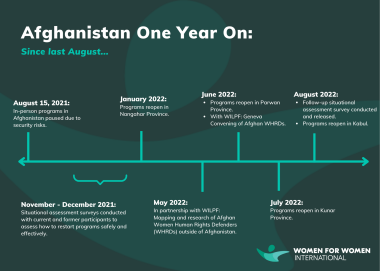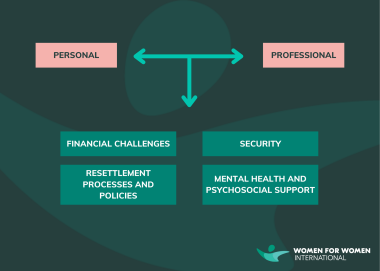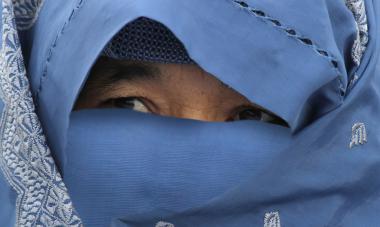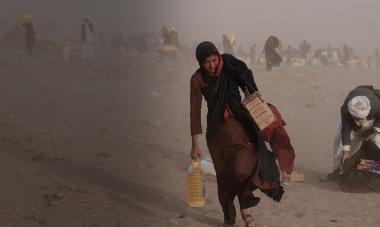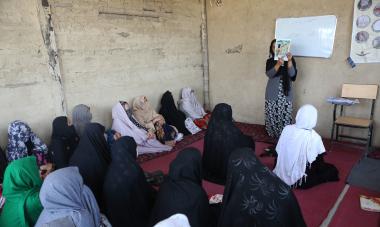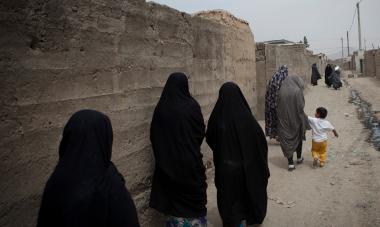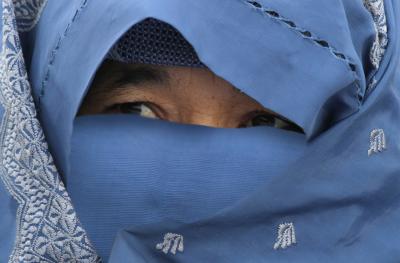Following the conclusion of the 77th session of the UN General Assembly in New York, Women for Women International reflects on the past year of global advocacy, research, and program delivery to support women in Afghanistan.
In the past year since the Taliban takeover of Kabul, Women for Women International has restarted its programs in Afghanistan and has been slowly expanding across and within provinces. This in an instance where we can truly say that it was thanks to our supporters – and, of course, our dedicated and brave colleagues in Afghanistan – that we were able to continue our work at a time when most funders were suspending projects or restricting the flow of funding into the country.
Though we are immensely grateful that we have been able to continue our programming to support women inside Afghanistan, it was not without challenges – and these challenges are even greater for national women’s rights and civil society organizations struggling to maintain their crucial operations. We also recognize that more support and comprehensive policy solutions are needed in order to fully address the humanitarian and human rights crisis still affecting Afghan citizens today.
Over the past year, Women for Women International conducted situational assessments to understand how to restart our programs in a manner that was safest for the women participating. The situational assessments – the first conducted in December 2021 and a follow-up conducted half a year later in July 2022 - also helped us to hear from Afghan women firsthand about their experiences over the year, their top needs and priorities, and the hopes that they still have for their futures so that we could translate their input into a policy agenda that would inform our global advocacy.
We also partnered with the Women’s International League for Peace and Freedom to conduct a mapping and research with Afghan women rights activists (WRAs) and women human rights defenders (WHRDs) who were evacuated from Afghanistan – most of them after the Taliban takeover – and who are currently residing in transit and host countries around the world. This research, available as a research report and a policy brief, sought to understand the personal and professional challenges that Afghan WRAs/WHRDs face in continuing their work and advocacy for Afghan women’s rights from outside of the country.
“As a human being I have to understand where I am going, and I have to be able to choose where I am.”
Afghan WRA/WHRD, based in United Arab Emirates (June 2022 “Where I am Going and Where I am” Report)
What did we hear from Afghan women?
When asked, Afghan women inside and outside Afghanistan described the financial, security, policy, and mental health challenges they face.
Inside Afghanistan, 92% of the Afghan women we surveyed in Nangarhar, Parwan, and Kunar provinces shared that - since August 2021 - their income has declined, with a quarter sharing that their income dropped to and remained at zero. Further, only 4% of Afghan women we surveyed always had enough to eat, with a little over half reporting that they often/sometimes did not have enough to eat at home. (SOURCE)
“Previously if we were eating two times meal, now we are eating one time and also from one bread we have brought it to half bread.”
(July 2022 “No One Hears Our Voices” Report)
After August 2021, Afghan women described feelings of isolation and despair – 92% of the women we surveyed in December 2021 indicated that they needed greater mental health and psychosocial support. A year later, they continue to share personal grief in being unable to support their children amidst the lingering humanitarian and economic crisis within Afghanistan.
“After a lot of struggle, we are not able to fulfill the need of our family which created psychological problems for us.”
(July 2022 “No One Hears Our Voices” Report)
Afghan WRAs/WHRDs also described the personal and professional challenges they have faced since their evacuation from Afghanistan. Personal and professional challenges are often intersecting and interrelated – meaning that the international community cannot uphold Afghan women’s rights and leadership without addressing the personal challenges facing Afghan women inside AND outside the country.
"We call on the international community to help Afghan women, both inside and outside Afghanistan, determine their own destiny and become masters on their own two feet, able to defend their rights and use their expertise. Unfortunately, the expertise and experience of Afghan women have all been razed to the ground."
Afghan WRA/WHRD based in United Arab Emirates
What should the international community do?
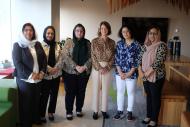
We translated our situational assessment findings into concrete recommendations for action by the international community. You can find these recommendations at the end of each of our policy reports, and over the past year we have been sharing these evidence-based recommendations with governments, institutions, and partners.
While sharing these recommendations, we also created and supported spaces for Afghan women to engage in direct dialogue with decisionmakers, as aligned with the principles of our advocacy agenda for action. Beyond being consistent with our own advocacy approach, Afghan women themselves have called for more opportunities to directly engage in dialogue with international leaders and with the de facto authorities within Afghanistan so that they can share recommendations, negotiate, and ask questions that matter most to them and to the women and communities that they are supporting.
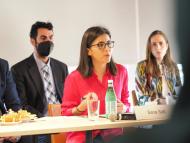
In one such direct engagement, we recently partnered with WILPF and the Norwegian Mission to the UN to co-host a private roundtable on how the international community can better support Afghan women and women’s rights organizations. This roundtable brought together high-level representatives from UN member states and agencies and Afghan women activists in early September so that Afghan women could openly discuss their priorities with world leaders prior to the UN General Assembly.
Some of their top recommendations were shared in a press briefing and the key themes shared over the course of their advocacy at the UN in September included:
- A plea for sustained urgency by the UN Security Council around negotiations for the full spectrum of women and girls’ rights inside of Afghanistan including – but not limited to – girls’ education.
- A call for the international community to move beyond solely humanitarian solutions to the crisis. Although humanitarian assistance has often been lifesaving over the past year, it is not a sustainable solution.
- Women’s rights organizations in Afghanistan need flexible and accessible funding to continue their work and lead the movement for Afghan women’s rights and livelihoods.
- Sustainable solutions to the economic crisis which include vocational training programs for women, restarting projects that create jobs for Afghan people, and restarting Afghanistan’s economy and infrastructure.
- More inclusive and transparent monitoring of the UN’s mandate and funding being spent within Afghanistan.
“The situation is getting worse and we are disappointed.”
(July 2022 “No One Hears Our Voices” Report)
Afghan women remain hopeful, but are critical of the limited action and progress made in the past year. And in some cases – such as the US decision to shift $3.5 billion of Afghanistan’s national assets to an “Afghan Fund” managed by the Swiss government and Afghanistan experts – there have been steps backward or missed opportunities by the international community in addressing the crisis in Afghanistan.
The Way Forward
Over a year after the Taliban takeover of Kabul, Afghan women have overwhelmingly conveyed that the international community cannot accept the restrictions on women’s rights in Afghanistan as the ‘new normal’.
At Women for Women International, we have heard loud and clear from our program participants that our programs are often a vital lifeline for women and their families where we work and that more support is needed. So, we will be prioritizing the continuation and safe expansion of our work inside of Afghanistan through
- Adaptations of our vocational training approach that allow women to safely participate,
- Provision of our usual monthly stipends along with emergency cash assistance which we have used over the past year to supplement stipends during the harsh winter season and following the earthquake in July,
- Staff capacity-strengthening to support them in building their resilience and any new skills they need to operate within the new and evolving working environment, and
- Supporting local partnerships with other women’s livelihoods and empowerment organizations.
We will also heed the call of Afghan women to not lose urgency in our global advocacy and allyship in the fight for Afghan women’s rights. Women for Women International will continue its advocacy to policymakers globally around evidence-based policy recommendations and experiences from our own continued work inside of Afghanistan. In the global movement for women’s rights, we owe Afghan women our active solidarity and our sustained support. Today, tomorrow, and always, we stand with them.
Please email Nisha Singh, nsingh@womenforwomen.org, or Stephanie Siddall, ssidall@womenforwomen.org, with any questions about Women for Women International’s global or Afghanistan-related advocacy.

